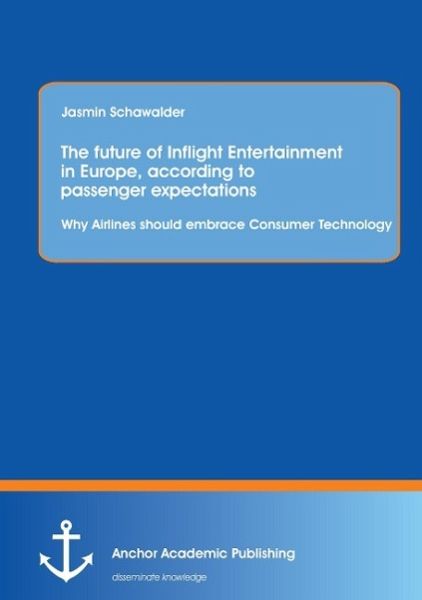
The future of Inflight Entertainment in Europe, according to passenger expectations: Why Airlines should embrace Consumer Technology

PAYBACK Punkte
0 °P sammeln!
Consumerization - passengers toting their tablets, laptops, smartphones and e-readers on planes - has forced airlines to re-think. Should they continue to invest heavily into Inflight Entertainment (IFE) systems, or just concentrate on offering Wi-Fi and power in the cabin? The goal of this research was to define the IFE offer of the future. Four barriers that split the world into the three regions Europe, Asia and USA in terms of IFE development were identified: the cultural, the commercial, the technological and the legal barrier. This book focuses on Europe, which lags mostly behind with IF...
Consumerization - passengers toting their tablets, laptops, smartphones and e-readers on planes - has forced airlines to re-think. Should they continue to invest heavily into Inflight Entertainment (IFE) systems, or just concentrate on offering Wi-Fi and power in the cabin? The goal of this research was to define the IFE offer of the future. Four barriers that split the world into the three regions Europe, Asia and USA in terms of IFE development were identified: the cultural, the commercial, the technological and the legal barrier. This book focuses on Europe, which lags mostly behind with IFE out of these three regions. For example, as opposed to the US, no major European airline offers inflight Wi-Fi widely on its network, and in contrast to leading Middle Eastern airlines none offers inflight live TV or the usage of mobile phones without restriction, like on the ground. The target was to define IFE from a consumer perspective. To capture the latter the author evaluated consumer satisfaction methodologies and decided to go with the Kano approach, which categorizes alternatives of a product or service, in this case IFE, in must-be, attractive and indifferent elements. A representative online survey revealed movies and power to be must-be, TV and Wi-Fi to be attractive and the rest, e-books, music, games and duty free onboard, to be indifferent elements of IFE. The majority of people indicated that they would pay for movies and Wi-Fi but not for power supply, TV or other content. Differently said, content-wise passengers only insisted in the supply of movies, for the rest they expected the airline to provide Internet and power so they themselves could get the content. Further, sub-groups were analysed - people within the sample with mutual characteristics like gender, travel frequency or ownership of smart devices. So was music on a plane a must for women and owners of iPhones were more willing to pay for apps than others. Overall, country of residence, travel purpose (leisure or business) and flight duration (long vs. short haul) were the greatest dividers re IFE requirements. To answer the core question of how the future IFE should be like, the author argues that consumerization means an enormous potential. If people are consuming IFE on their personal devices, IFE can finally be fully customized leading to an increase in its take up rate and revenue, as this research indicates. Moreover, it can work as a marketing tool outside the air cabin because it is delivered on a device that is constantly in a passenger s pocket. IFE is no longer restricted to the air cabin. Airlines have been asking themselves for too long What technology can we apply and what can we subsequently offer to passengers? instead of How does a frictionless great consumer experience of IFE present itself nowadays? It should no longer be Inflight Entertainment but Airline Entertainment, starting long before passengers board a plane, e.g. by being incorporated in the smart devices app of an airline, displaying games to men that are browsing flights and suggesting duty free bargains to holiday goers so they can add them onto a wish list and purchase the items when airborne. All of this, making entertainment part of the entire travel value chain.













